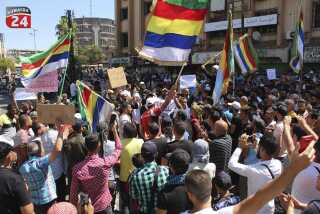King Says ‘Foreign Circles’ Incited Bread Riots in Jordan
- Share via
CAIRO — Jordan’s King Hussein blamed “foreign circles” Sunday for inciting the worst rioting in his country since he cautiously ushered in democratic reforms seven years ago, but critics said the government had foolishly ignored warnings that doubling bread prices would cause unrest.
Eleven opposition parties demanded the resignation of Prime Minister Karim Kabariti, whose pro-Western, market-oriented government ordered the price increases.
The disturbances began Friday and struck at least five cities and towns, leaving scores injured in battles between police and rock-throwing youths. Rioters burned several government offices and banks and in some cases fired on police, authorities said. Witnesses estimated that hundreds of people had been detained.
By Sunday evening, the army and police managed to impose a tense calm in the south of the country, with a round-the-clock curfew.
Although the immediate cause of the riots was the economy, political observers said the protesters also appeared to be venting their unhappiness with the king’s stewardship and the failure of Jordan’s 1994 peace treaty with Israel to bring wider prosperity.
Jordan plays a pivotal role in the Middle East, serving as a bridge between Israel and the Arab world and as a key U.S. ally. Any serious instability in the country would have ramifications for the entire region, but the king’s popularity and his nimble diplomacy over the years have so far shielded his rule from any such danger.
After the last serious bout of price riots, in 1989, the king began cautious political reforms that have made the country one of the area’s most democratic. The same increased freedoms have given government critics more latitude, however, and may have contributed to the weekend unrest.
Hussein--who donned a military uniform Saturday and toured the worst-hit city, Al Karak--gave an interview to state television Sunday night in which he claimed to have the situation under control. He pointed a finger of blame at “foreign circles,” widely understood to mean Iraq.
These elements “have chosen the current situation to gain sympathy and to exploit the sentiments of simple people,” the monarch said. Some of the rioters were “people who were either educated in Iraq or had sympathies toward Iraq,” he told the Cable News Network in another interview.
Others in Jordan dismissed that explanation, pointing out that the price increases on bread, tea and other staples were hitting at the basic diet of the masses of impoverished people in the country of 4 million.
“When the demonstrations started, it was quite spontaneous. . . . No foreign power has such an influence,” said political scientist Labib Kamhawi, director of the Arab Organization for Human Rights in Jordan.
Kamhawi said detentions accelerated Sunday, including preemptive arrests in places where there had been no rioting. “I don’t believe this is it,” he said, predicting more unrest. “All the ingredients of another flare-up are there.”
Milhem Tal, a spokesman for the 11 parties opposing the government, said, “We blame the government for what happened after it ignored other opinions and did not listen to anyone.” The parties include the Islamic Action Front, the political arm of the fundamentalist Muslim Brotherhood organization and Jordan’s largest opposition party.
*
Kabariti’s government raised bread prices Tuesday after a week of heated debate on cutting food subsidies in line with the government’s economic reform program. The king backed the decision even though he reportedly had been warned by his intelligence services that it could lead to a public outburst.
Riots erupted first in Al Karak and spread Saturday to other towns, including Maan and Al Tafilah, and even to sections of Amman, the capital. Hussein hastily dissolved a special session of parliament that had been blasting the price increases and said he would respond with an “iron fist.”
Amman was described as tense, and analysts believed that Kabariti’s government, in office less than a year, might have to be sacrificed. The prime minister’s job, however, is traditionally a revolving door in Jordan, with real power always residing with the king.
More to Read
Sign up for Essential California
The most important California stories and recommendations in your inbox every morning.
You may occasionally receive promotional content from the Los Angeles Times.













